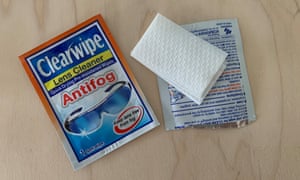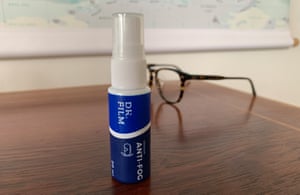When the request went out for a “bespectacled guinea pig” to test if anti-fog treatments actually work when you wear a face mask, I was desperate.
As someone with such a strong genetic predisposition for eyesight issues that I practically came out of the womb wearing glasses, lens fogging has long been a frustration. Even when I’m not wearing a mask, my glasses will fog up after something as innocent as a run for the bus.
Now that mask use is the norm, glasses fogging has become an unavoidable part of daily life. And it’s absolutely maddening.
As a journalist, the rising fog has become particularly stressful at press conferences.
Having repeatedly asked New South Wales premier Gladys Berejiklian what she believed the benefits were of holding off making masks mandatory in late December, I was cursing myself in the coming days when, after she urged everyone to wear one as a precaution, I found myself unable to see her standing two metres in front of me.
Recently, I’ve resorted to wearing a face shield on late-night trips to the supermarket, mocked by friends who’ve caught me in the act. I thought there had to be a better way.
It turns out, there is.
Anti-fog wipes

I was able to pick up a pack of Clearwipe Antifog Lens Cleaners from Chemist Warehouse for $4.49, and they’re widely available elsewhere too. The box contains 20 single-use microfibre wipes – in little sachets, similar to hand cleaners from fast-food restaurants.
These also clean your lenses, and unlike the spray and gel, are only designed for eyeglasses.
These wipes are easy to apply and the glasses dry quickly, but while they made my lenses look nice and clear, as you’d expect from a cleaning product, the anti-fog results were underwhelming.
To test if these wipes work, I wore a disposable mask, with the wire bent snugly around my nose and the loops inverted around my ears (a tip I’d heard reduces fogging).
My glasses fogged after taking a few average breaths and speaking some random words to mimic conversation.
The verdict: There was slightly less fog compared with untreated glasses, but not enough to stop me being driven insane after 30 seconds.
Anti-fog spray

Dr Film’s Premium Anti-Fog Spray ($29.95) applies just how you’d imagine a spray would. After coating both the front and back of each lens to give it the best chance at success, I let the liquid dry without rinsing, as per the instructions.
Once it dries, there is a very fine but noticeable film over the lenses, which makes the glasses slightly translucent – the sort of state that would ordinarily prompt you to clean them.
Using a different pair of glasses, but the same disposable mask – with nose wire and inverted ear straps – I took some test breaths and spoke.
My glasses still fogged up, but it wasn’t as intense as with bare lenses. While the fogging seemed limited to the edges of the lens frames, it was still very noticeable.
The verdict: This spray is also designed to be used on sports goggles and snorkelling masks. So it’s possible that while it can deal with the heat and associated steam that come off eyeballs, it can’t cope with hot breath.
Anti-fog gel

Pro Gear’s Anti-Fog Cleaning Gel ($19.95) is fiddly. It comes in a tiny (5g) tube, which needs to be unscrewed – no easy task. From there you need to cut the tip of the tube’s spout with scissors.
Using a third pair of glasses, I applied a very small dot, about the size of a sesame seed, on to both the front and back of each lens, and rubbed it in with the cloth provided until the lenses were dry.
I put the glasses on and wore the same test mask as previously.
I took a deep breath in, and exhaled. No fog. I then exclaimed “Wow, no fog!” – an utterance which produced no fog.
I then tried with a reusable face mask (mine was from Uniqlo) which I’d bought months ago, and wore once before realising it didn’t have a nose-fitting wire and fogged my glasses. Even with this mask, I was able to breath and talk without fogging my glasses at all.
I brought the glasses to my mouth and hushed heavily on them – in the way you do before wiping them generally. No fog.
So excited by the clear lenses in front of me, I ran to turn on my kettle and stuck my face directly over the rising steam.
No fog. However doing this seemed to push the limits of the gel’s technology, as a slight water residue formed along parts of the lenses. This didn’t fog up the lenses, but it made my glasses a tad blurry until the water dried about 30 seconds later.
The verdict: It’s hard to believe I went months before trying this gel, and given it’s cheaper than the somewhat less effective spray, I’ll be recommending it to every four-eyes I see in the street.
from Lifestyle | The Guardian https://ift.tt/3jaGxuH
via IFTTT

comment 0 Comment
more_vert